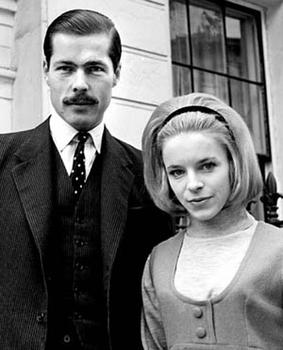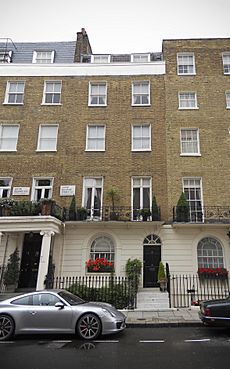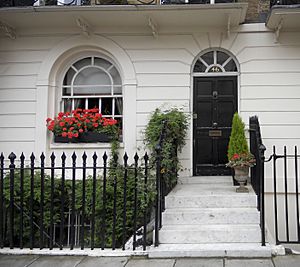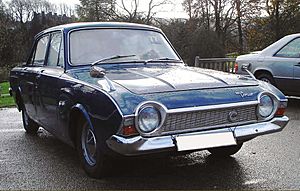John Bingham, 7th Earl of Lucan facts for kids
Richard John Bingham, the 7th Earl of Lucan, often called Lord Lucan, was a British nobleman who vanished mysteriously. He was born on 18 December 1934 and disappeared on 8 November 1974. He was officially declared dead on 3 February 2016.
Lord Lucan was an Anglo-Irish aristocrat, the oldest son of George Bingham, the 6th Earl of Lucan. During the Second World War, he was sent away for safety but later returned to attend Eton College. After school, he served in the Coldstream Guards in West Germany from 1953 to 1955. He loved to gamble, playing games like backgammon and bridge. He was an early member of the exclusive Clermont Club, a place where rich British gamblers met. Even though he often lost more money than he won, he left his job at a bank in London to become a professional gambler. Before his father passed away, he was known as Lord Bingham from 1949 to 1964.
Lucan was even considered for the role of James Bond in the movies! He enjoyed expensive hobbies, like racing power boats and driving an Aston Martin. In 1963, he married Veronica Duncan, and they had three children. In 1967, they moved into a house at 46 Lower Belgrave Street in Belgravia. Their marriage faced difficulties in late 1972, and Lucan moved out. A difficult disagreement followed about who should care for their children, which Lucan eventually lost. He seemed very focused on getting his children back and even watched his wife and recorded their phone calls. This strong desire, along with growing legal bills and gambling losses, greatly affected his life and money.
On the evening of 7 November 1974, Sandra Rivett, the nanny for Lucan's children, was tragically killed in the kitchen of the family home. Lady Lucan was also attacked when she went to check on Sandra. Lady Lucan later said she recognized Lord Lucan as her attacker. By then, Lucan had driven to visit a friend in Uckfield, East Sussex. He then called his mother and asked her to pick up his children, saying something serious had happened at the house. He also wrote a letter. His car was later found abandoned in Newhaven. When the police issued a warrant for his arrest a few days later, Lucan had disappeared. At the official investigation into Sandra Rivett's death in June 1975, the jury concluded that Lucan was her killer.
People have remained very interested in what happened to Lucan, with many supposed sightings reported around the world, but none have been proven true. Despite a police investigation and lots of news coverage, Lucan has never been found. He was presumed dead in 1992 and officially declared legally dead in October 1999. In 2016, a death certificate was issued, which allowed his son, George, to inherit his titles.
Quick facts for kids
The Earl of Lucan
|
|
|---|---|

Lucan with his wife in 1963
|
|
| Other titles |
|
| Born | Richard John Bingham 18 December 1934 Marylebone, London, England |
| Disappeared | 8 November 1974 (aged 39) England |
| Status | Declared dead in 1999, with an official death certificate being issued on 3 February 2016 (aged 81) |
| Other names | Lucky Lucan |
| Occupation |
|
| Title | 7th Earl of Lucan |
| Predecessor | George Bingham, 6th Earl of Lucan |
| Successor | George Bingham, 8th Earl of Lucan |
| Spouse(s) |
Veronica Mary Duncan
(m. 1963) |
| Children | 3, including:
|
| Parents |
|
| Military career | |
| Allegiance | |
| Service/ |
|
| Years of service | 1953–1955 |
| Rank | Second lieutenant |
| Unit | Coldstream Guards |
Contents
Early Life and School
Richard John Bingham was born on 18 December 1934 in Marylebone, London. He was the second child and older son of George Bingham, 6th Earl of Lucan, a British nobleman, and his wife Kaitlin Elizabeth Anne Dawson. Because his mother was ill, John, as he was called, was first cared for by the family's nanny. When he was three, John went to a pre-prep school with his older sister Jane. In 1939, as the Second World War was about to begin, they were taken to the safer area of Wales.
In 1940, John and his siblings, Sally and Hugh, traveled to Toronto, Canada. They soon moved to Mount Kisco, New York, in the United States. They stayed for five years with a very wealthy woman named Marcia Brady Tucker. John went to The Harvey School and spent summer holidays at a camp in the Adirondack Mountains.
While in the US, John and his siblings lived a grand life and had everything they wanted. But when they returned to England in February 1945, they faced the tough reality of wartime Britain. Food rationing was still in place, their old home had been bombed, and the windows of their family house had been blown out. Even though their family had a noble history, John's parents preferred a simpler life than the very rich one offered by Tucker. For a while, John had nightmares and saw a therapist to help him. As an adult, he remained open-minded about religion but made sure his children went to Sunday school, wanting them to have a traditional childhood.
At Eton College, John started to enjoy gambling. He earned extra money by taking bets, putting his winnings into a "secret" bank account. He often left school grounds to go to horse races. His mother said his school grades were "far from creditable," but he became a leader in his house before leaving in 1953 for his National Service. He became a second lieutenant in his father's regiment, the Coldstream Guards, and was mostly stationed in Krefeld, West Germany. While there, he also became a keen poker player.
Career and Gambling
After leaving the British Army in 1954, Lucan joined a bank in London. In 1960, he met Stephen Raphael, a wealthy stockbroker who was very good at backgammon. They went on holidays together, water-skied, and played golf, backgammon, and poker. Lucan became a regular gambler and an early member of John Aspinall's Clermont gaming club in Berkeley Square.
Lucan often won at games of skill like backgammon and bridge, but he also had huge losses. Once, he lost £8,000, which was about two-thirds of the money he received each year from family funds. On another bad night at a casino, he lost £10,000. His uncle helped him pay that debt, and Lucan paid him back two years later.
Lucan left the bank around 1960, shortly after winning £26,000 playing a card game. A colleague had been promoted before him, which made Lucan leave his job in protest. He said, "Why should I work in a bank, when I can earn a year's money in one single night at the tables?" Lucan traveled to the US, where he played golf, raced power boats, and drove his Aston Martin along the West Coast. He also visited his older sister Jane and his former guardian, Marcia Tucker. When he returned to England, he moved out of his parents' home and into a flat in Park Crescent.
As a professional gambler, Lucan was a skilled player, once ranked among the world's top 10 backgammon players. He won tournaments and was champion of the west coast of America. He was nicknamed "Lucky" Lucan, but his losses often outweighed his winnings, meaning he wasn't always lucky. Lucan also had interests in thoroughbred horses. Despite some arguments about money, Veronica mostly didn't know about his large losses.
Family Life
Marriage and Children
Lucan met his future wife, Veronica Duncan, in early 1963. She was born in 1937. After her father died, her family moved to South Africa, then returned to England. Veronica studied art and later worked as a model and secretary in London. Her sister married into a wealthy family, which introduced Veronica to London's high society. Veronica and Lucan first met at a golf club event.
Their engagement was announced in newspapers in October 1963, and they married on 20 November. After their wedding, they honeymooned in Europe, traveling first class on the Orient Express. Lucan's father helped him financially, which allowed him to buy 46 Lower Belgrave Street in Belgravia and decorate it for Veronica.

Two months after the wedding, on 21 January 1964, Lucan's father passed away. Lucan inherited his father's titles, becoming the Earl of Lucan, and his wife became the Countess of Lucan.
The couple had three children:
- Lady Frances Bingham, born on 24 October 1964
- Lord George Bingham, born on 21 September 1967
- Lady Camilla Bingham, born on 30 June 1970.
After their first daughter, Frances, was born in 1964, they hired a nanny, Lillian Jenkins, to help care for her. Lucan tried to teach Veronica about gambling and traditional activities like hunting and fishing. He bought her golf lessons, but she later stopped playing the sport.
Lucan's daily routine often involved breakfast, reading newspapers, playing piano, and sometimes jogging. He would have lunch at the Clermont Club, followed by backgammon games. In the evenings, he would often return to the Clermont to gamble until the early hours. He once wrote that he wanted "£2m in the bank" for "motor-cars, yachts, expensive holidays, and security for the future."
Friends described Lucan as a quiet man, but his tall height, mustache, and adventurous hobbies made him popular. He spent a lot of money, even hiring private planes to take friends to races and buying expensive cars. In 1966, he tried out for a movie role but didn't get it. He later turned down an offer to try out for the role of James Bond.
Marital Difficulties
After George and Camilla were born, Veronica felt very sad and struggled with her feelings. Lucan became more involved in her well-being, and in 1971, he took her to a clinic where she saw doctors to help her feel better. In July 1972, the family went on holiday, but Veronica quickly returned to England, leaving Lucan with their two older children. The stress of managing their money, Lucan's gambling, and Veronica's emotional state put a strain on their marriage. Two weeks after a difficult Christmas in 1972, Lucan moved into a small property nearby.
Some months later, Lucan moved to a larger rented flat. Although his wife tried to make up, Lucan only wanted to have the children live with him. To try and show that Veronica was not fit to care for them, Lucan began to watch his family, and later hired private detectives to do the same. He also spoke to doctors, who explained that his wife was suffering from sadness and worry, not "madness."
Lucan told his friends that no one would work for Veronica. She had fired Lillian Jenkins, the children's long-term nanny. One nanny, Stefanja Sawicka, was told by Veronica that Lucan had hit her and pushed her down the stairs. The countess seemed to fear for her safety and told Sawicka not to be surprised "if he kills me one day."
Sawicka's time at the Lucan home ended in March 1973. While with two of the children, she was approached by Lucan and two private detectives. They told her that the children were temporarily under court protection and that she must give them to him, which she did. Veronica asked the court to have the children returned. The judge set a hearing for three months later.
To defend herself against Lucan's claims about her mental state, Veronica stayed for four days at a clinic. Doctors reported that while she still needed some support, there was no sign she was mentally ill. Lucan's case relied on Veronica being unable to care for the children, but at the hearing, he had to defend his own behavior toward her. After weeks of arguments, he gave up the case. The judge, not impressed by Lucan, decided that Veronica should have custody. The earl was allowed to see his children every other weekend.
This started a difficult disagreement between the couple. Lucan again began to watch his wife's movements. He recorded some of their phone conversations and played parts for friends. He also told friends and his bank manager that Veronica was "spending money like water." Lucan continued to pay her a small amount each week. He also delayed payments for milk and for the nanny agency, knowing that Veronica was required by the court to have a live-in nanny. With no income of her own, Veronica took a part-time job at a local hospital.
A temporary nanny, Elizabeth Murphy, became friends with Lucan, who bought her drinks and asked her for information about his wife. He hired his detective agency to investigate Murphy, looking for proof that she was not taking good care of his children. He stopped using the detective agency when they sent him large bills. Another temporary nanny reported strange phone calls to the house. After several temporary nannies, Sandra Rivett started work in late 1974.
The Tragic Incident
Sandra Eleanor Rivett was born on 16 September 1945. She was a popular child. She worked as a hairdresser and then a secretary. After some personal difficulties, she worked as a children's nanny for a doctor. She had a son in 1964, who was later adopted by her parents. Sandra later worked at a home for the elderly before moving to Portsmouth. There she met Roger Rivett, and they married in 1967. Roger worked in the Royal Navy and later as a loader. Sandra worked part-time at an orphanage.
Their marriage ended in May 1974. Sandra then worked for a domestic agency and cared for an elderly couple. A few weeks later, she began to work for the Lucans.
Sandra usually went out with her boyfriend on Thursday nights, but she had changed her night off. They last spoke on the phone around 8:00 pm on 7 November. After putting the younger children to bed, around 8:55 pm, she asked Veronica if she wanted tea and went downstairs to the basement kitchen to make it. As she entered the room, Sandra was killed. Meanwhile, Lady Lucan wondered what was taking her nanny so long and went downstairs to see what had happened. She called to Rivett from the top of the basement stairs and was then attacked herself.
Lady Lucan later said she recognized her husband's voice at that moment. When she asked where Rivett was, Lucan was at first unclear but eventually admitted to having killed her. Lady Lucan, terrified, told him she could help him escape if he stayed at the house for a few days to let her injuries heal.
Lucan went upstairs and sent his daughter to bed, then went into one of the bedrooms. Lady Lucan realized her husband would not hear her from the bathroom and escaped, running outside to a nearby public house, the Plumbers Arms.
Lucan may have arrived at a friend's home sometime between 10:00 pm and 10:30 pm. The friend ignored the door but soon received a confused phone call. Lucan definitely called his mother between 10:30 pm and 11:00 pm and asked her to pick up the children. His mother said he spoke of a "terrible catastrophe" at his wife's home. He told her he had been driving past the house when he saw Veronica fighting with a man in the basement. He said he went inside and found his wife screaming.
Lucan drove about 42 miles to Uckfield, East Sussex, to visit his friends, the Maxwell-Scotts. Susan Maxwell-Scott's meeting with Lucan was the last confirmed time anyone saw him.
What Happened Next and Sightings
The last confirmed sighting of Lucan was around 1:15 am on 8 November 1974, as he left the Maxwell-Scott property in a Ford Corsair. His final fate remains a mystery.
A detective who led a new investigation into Lucan's disappearance 32 years later told a newspaper that "the evidence points towards the fact that Lord Lucan left the country and lived abroad for a number of years." Some people believe Lucan might have been helped out of the country by secret financiers.
Lucan's disappearance has fascinated the public for decades, with thousands of sightings reported around the world. One early sighting turned out to be a British politician who had tried to fake his own death. Police traveled to France for another lead, but it led nowhere. A sighting in Colombia turned out to be an American businessman.
In 2003, a former detective thought he had found the earl in Goa, India, but the man was actually a folk singer from England. In 2007, reporters in New Zealand interviewed a homeless British person who neighbors claimed was the missing earl.
George Bingham, Lucan's son, denied claims that he and his sister were sent to Gabon in the early 1980s so their father could secretly watch them. Lady Lucan also said the newspaper claims of sightings were "nonsense," stating her husband "was not the sort of Englishman to cope abroad."
In 2020, a sighting was reported in Australia. A senior citizen living in suburban Brisbane was claimed to be Lord Lucan by a leading computer scientist. This scientist said that advanced facial recognition technology had positively identified the elderly man as the missing British nobleman. The man, who lives in a Buddhist community, was found by Ms. Rivett’s son. The elderly man is the same age as Lucan. However, the man denied being Lord Lucan, and no solid proof has been provided that he is, or has any connection with, the missing peer.
Images for kids
 | Sharif Bey |
 | Hale Woodruff |
 | Richmond Barthé |
 | Purvis Young |




